“It was the most enlightening classroom experience I have ever had in my life. We learnt a lot of things on Scripture, Catechesis, marriage counselling among many other topics. It took me more than five years to graduate but the time passed by very fast,” he said.
Mr. Malik was in the pioneer class of the Lay Catholic graduate school that was founded in the Archdiocese of Benin City by Archbishop Augustine Obiora Akubeze, the Local Ordinary of the Nigerian Archdiocese in 2013.
In a Thursday, October 14 interview with ACI Africa, Fr. Andrew Ovienloba, the President of the Catholic institution said that the school was a response to the 2012 proclamation of the Year of Faith, which Pope Benedict XVI declared as a call to Catholics to study and reflect on the catechism to deepen their knowledge of the faith.
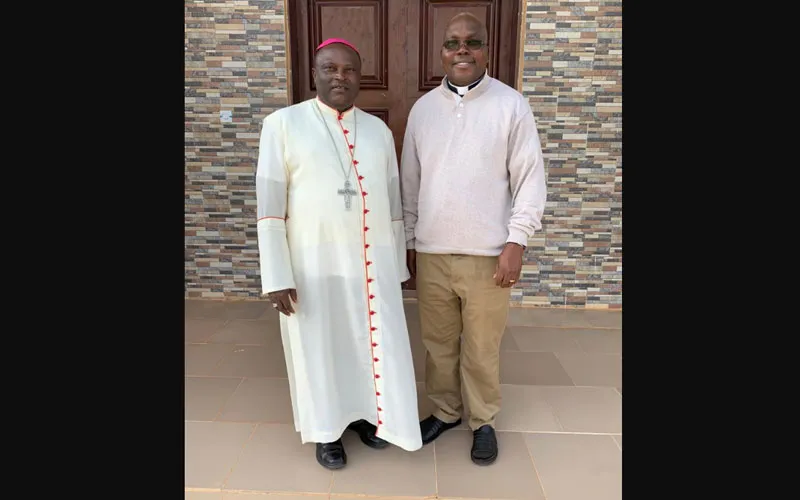 Credit: Fr. Dr. Andrew Ovienloba
Credit: Fr. Dr. Andrew Ovienloba
“It is true that many Catholics are very ignorant about their faith,” Fr. Ovienloba said, and added, “Not many people go back to reflect on the catechism after they become confirmed Catholics. The least that many do is renew their Church teachings shortly before they are married in Church. After that, they just become Sunday church goers.”
(Story continues below)
“Archbishop Augustine felt it important to reignite the people’s faith. The School of the Faith and Leadership has ground Catholics into deep Christian teachings,” the school President said.
The Archbishop “created the school to mark the end of the year of the faith in 2013,” Fr. Ovienloba recalled during the interview, and quoted Archbishop Akubeze as saying, “I wanted the gains and blessings of the year of the faith to have a lasting legacy among the Faithful of the Archdiocese.”\
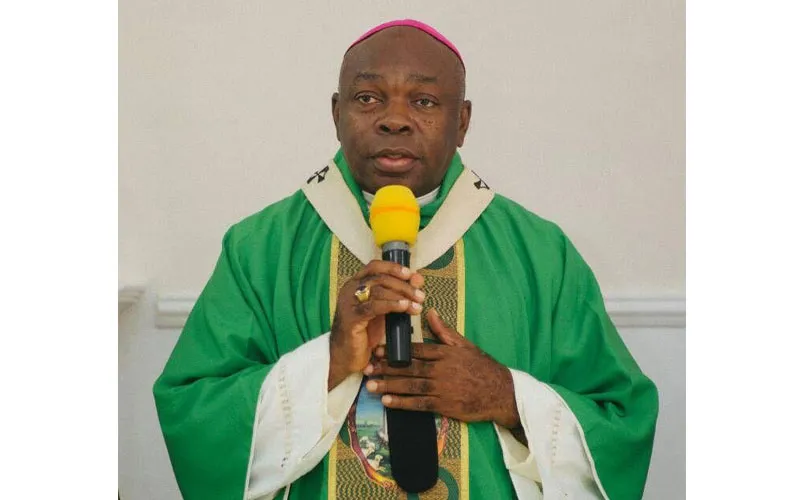 Credit: Fr. Dr. Andrew Ovienloba
Credit: Fr. Dr. Andrew Ovienloba
The year of the faith could not have just ended as a mere historical event, the Nigerian Priest reminisced about the Archbishop who wanted some legacy around the Year of Faith.
According to Fr. Ovienloba, in establishing the Lay Catholic graduate school, Archbishop Akubeze aimed at equipping “all with the required resources.”
The Priest quoted the Archbishop as having said, “I wanted every Catholic to keep focusing on the reason we are Christians and the mission we have as Christians namely, to own our faith and be able to share that faith confidently and courageously.”
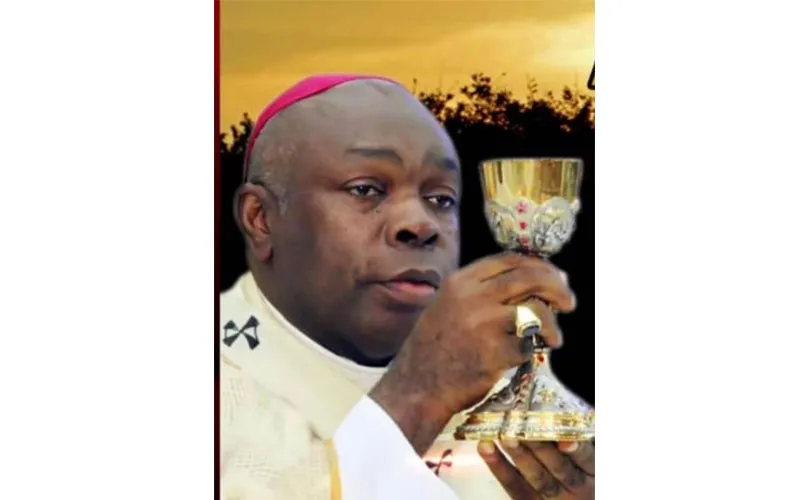 Credit: Fr. Dr. Andrew Ovienloba
Credit: Fr. Dr. Andrew Ovienloba
He had also “the vision to grow the faith in the shores of the ancient kingdom of Benin,” the Nigerian Priest further said in reference to his Local Ordinary founding the school, adding that the Archbishop’s intention to foster the faith of the people of God under his pastoral care was further reinforced by the historical significance of the Archdiocese as “one of the oldest Episcopal Sees in Nigeria, having been created in 1884.”
With two campuses within the Nigerian Archdiocese, the Lay Catholic graduate school is accredited by the office of the Congregation for Evangelization at the Vatican and gets its secular degree of Master of Science in Religious Education from its affiliation to the University of Anahuac in Mexico.
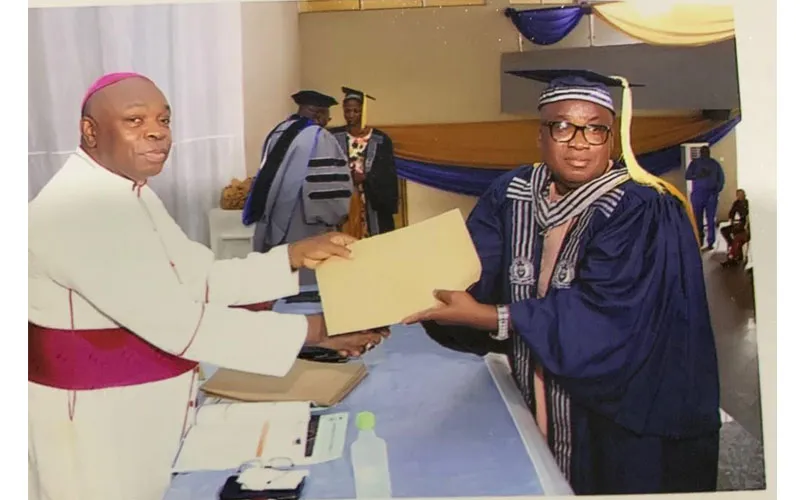 Credit: Fr. Dr. Andrew Ovienloba
Credit: Fr. Dr. Andrew Ovienloba
Information that Fr. Ovienloba indicates that currently, there are over 55 Dioceses across the world that have opened their doors to the rich benefit of the program, with the Archdiocese of Benin City being the “first in the shores of Africa and the only one that has graduated her students at the highest levels of Educators in the Faith.”
Other international affiliates are in Mexico, Argentina, the U.S., Guatemala, Nicaragua, Chile, Colombia, El Salvador, Brazil, Spain, Venezuela, Peru, and more recently, Ghana and Zambia.
According to the Nigerian Priest, the graduate school is mandated by the Holy See to raise up a rich laity in catechetical and theological resource to offset syncretism (a mixture of paganism and Christianity) in order for the faithful to become fully human, well informed Catholics capable of responding to the needs of her local church.
Fr. Ovienloba told ACI Africa that syncretism is manifest in the Church in the way that Christians who go to Church also participate in backward cultural practices.
“There is no commitment in the Church for people who go to Church and still consult witchdoctors. As Priests, we are sometimes embarrassed when we go to bury one of our Christians and find other cults claiming that the deceased was one of their own,” the Priest says.
The danger of syncretism and the lack of a well-grounded faith, Fr. Ovienloba notes, is that Christians fail to transmit their faith to the next generations of Christians. This, he adds, is one of the gaps that the graduate school he is overseeing is trying to address.
Programs offered at the school include a four-year Master of Science in Religious Education, a four-year Educator in the Faith degree, a two-year Diploma in Basic theology, Certificate in Fundamental Catechesis and a six-month Restorative Justice and Pastoral Peace Leadership training.
All the programs have varied academic entry requirements, with the Master’s program admitting University graduates and the Restorative Justice and Pastoral Peace Leadership training course accepting students with higher level certificate training with the ability to comprehend seminar style lectures and presentations.
Courses offered are predominantly theological and include Scripture introduction to the Bible; Old Testament, New Testament, Lectio Divina; Introduction to the Faith; Christian Spirituality (Lay Spirituality, Prayer, Liturgy, Sacraments) and Catechesis (Practical Catechesis, Family Catechesis, Social Catechesis).
Others are Moral theology; Integral Human formation, Social Justice, Eschatology, Pastoral Counseling, Specific Moral theology, Fundamental Moral theology; Bioethics, Ten Commandments, Pastoral Leadership/ Four-framed approach to organizational Leadership, Church History, Mariology, Christology, Restorative justice approach to conflict and Crisis mediation (Family and social), Islamic theology, among others.
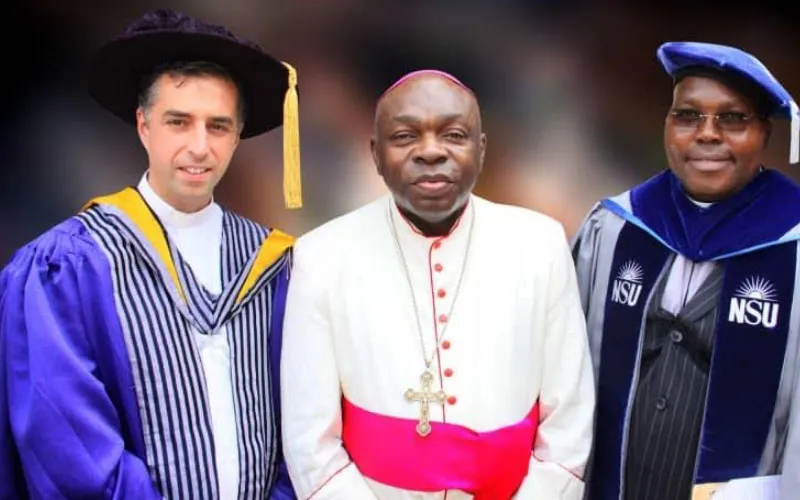 Credit: Fr. Dr. Andrew Ovienloba
Credit: Fr. Dr. Andrew Ovienloba
Fr. Ovienloba told ACI Africa that plans are underway to introduce other cutting-edge and more specific courses in marriage so as to have marriage certified structures in the Church. There are also plans to train lay spiritual directors whose ministry will be to address specific spiritual needs of the people and to refer those who cannot access the pastoral services of a Priest to the Church.
At the moment, classes are offered to adult Catholics from various professions including Catechists, lawyers, active professors, medical doctors, nurses, teachers, civil servants, politicians, pharmacists, engineers, and other private persons.
The program, which is also open to youths has, however, attracted very few young people, the member of the Clergy of Benin City Archdiocese tells ACI Africa.
“Young people are encouraged to come but they come in very few numbers. I think young people are out there trying everything they can to make money. We have mostly attracted retirees who have a lot of time to study and deepen their understanding of the Church,” he said, and added, “We also don't have children enrolled because of the level and volume of our programs.”
Just like any other university, students at the School of the Faith and Leadership sit for their examinations at the end of every semester. The students also sit for the final exams where their understanding of the various dogmas of the Catholic Church and the depth of their spirituality is tested. Those who graduate work on the Archdiocesan evangelization team, teach Catechism, and assist in marriage counselling in various Parishes.
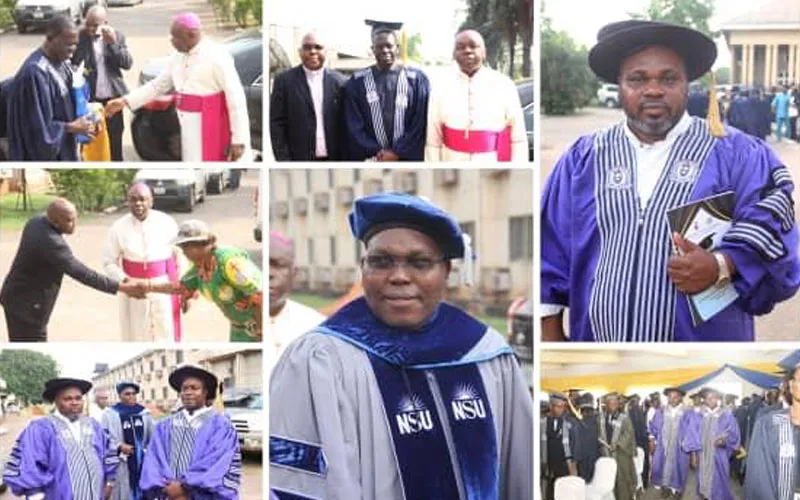 Credit: Fr. Dr. Andrew Ovienloba
Credit: Fr. Dr. Andrew Ovienloba
Before their final examinations, the students are required to research on their topic of interest to respond to a particular issue within the Church.
To be allowed to graduate, Mr. Malik wrote a proposal on the Eucharist and went ahead to investigate factors that hinder some people from receiving the Sacrament.
“From the interviews I did with more than 400 people, I realized that many things hinder Catholics from receiving the Eucharist. But failure to go for confession and not being married in Church stood out,” Mr. Malik told ACI Africa October 14.
His recommendation was for Catholics who, for one reason or the other, have not confessed their sins, to go ahead and receive the Eucharist and to find the closest time possible to repent their sins.
“I recommend that nothing should stand in the way of a Catholic who is allowed to receive Holy communion from receiving the Sacrament. There are things that the Sacrament does to a sinner who has shown remorse and a commitment to go for confession after receiving the Holy Eucharist,” he said, and explained, “The Eucharist has an unmatched satisfying grace. It grants forgiveness of sins. It restores virtue, and reconciles one deeply with God.”
Today, Mr. Malik is a member of the evangelization committee back in his Parish where he also serves in the finance council. He also organizes marriage classes for those aspiring to get married.
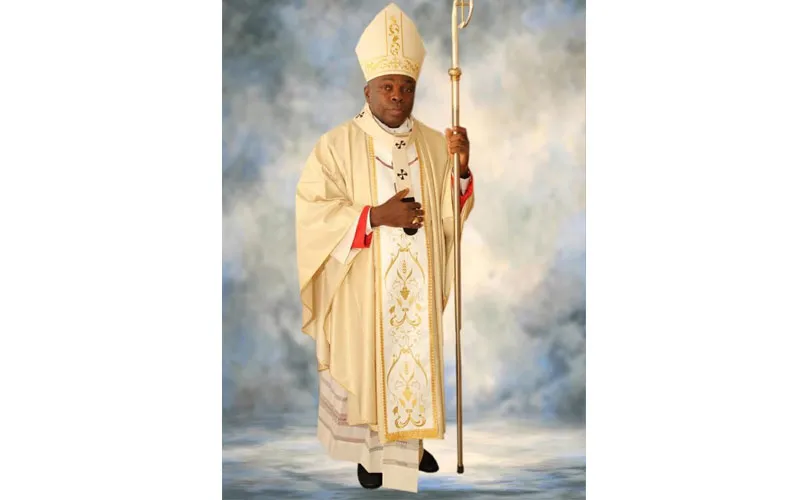 Credit: Fr. Dr. Andrew Ovienloba
Credit: Fr. Dr. Andrew Ovienloba
He says that the training at the School of the Faith and Leadership has changed his life and that his aim is to impart the skills he has learnt to others.
“I understand that to whom much is given, much will be required. I have known a lot about my faith and I would like to spread the good news to others,” he said.
According to Fr. Ovienloba, the training is aimed to equip Catholics with tools to cope in the society that he says is full of judgement.
“Many times, Catholics get attacked because of what they believe in and how they pray. Most times, people get discouraged when they are attacked because they don’t have the necessary tools to defend their faith. This faith equips the people with these tools,” he said.
The Priest shares that 130 students have already graduated at the school from the time it was started. Additionally, 200 students enrolled in the school last year before COVID-19 broke out.
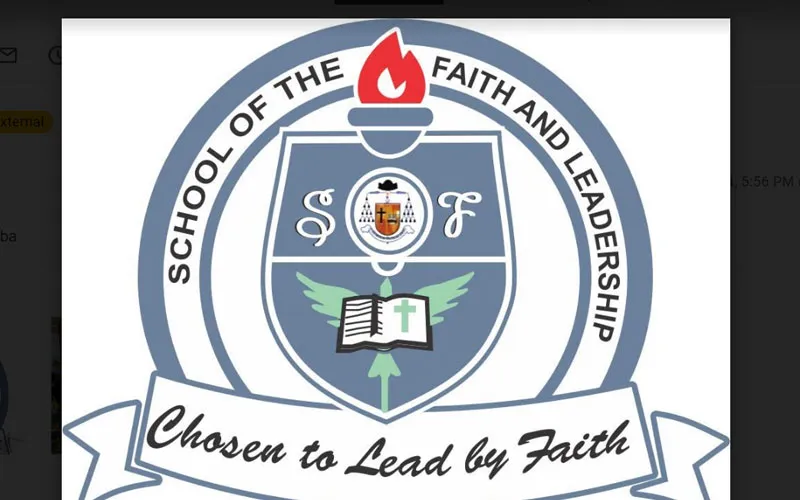 Credit: Fr. Dr. Andrew Ovienloba
Credit: Fr. Dr. Andrew Ovienloba
He calls upon other Catholic Dioceses in Africa to replicate the training of lay people and equip them with knowledge that they will in turn pass on to other generations.
“The more lay persons are educated, the more the faith will grow. There is a need to transmit our faith to future generations. Weaknesses in the transmission of faith have already cost many developed countries that are now trying to re-evangelize their people,” he said.
Fr. Ovienloba said that 97 percent of students currently enrolled in the Monday and Tuesday classes that start at 4 p.m. and end at 6 p.m. are all drawn from Benin City Archdiocese.
Recently, the Catholic Diocese of Pankshin located in the Ecclesiastical Province of Jos and the Diocese of Sokoto in Northern Nigeria have expressed an interest in starting a chapter of the school, he said.
The decision to start the school in the two Dioceses is timely, the Nigerian Priest told ACI Africa October 14, and added, “In Sokoto where Christians are experiencing persecution, the training of the lay people will reinforce their faith and give them the joy of the Gospel amid persecution.”
Agnes Aineah is a Kenyan journalist with a background in digital and newspaper reporting. She holds a Master of Arts in Digital Journalism from the Aga Khan University, Graduate School of Media and Communications and a Bachelor's Degree in Linguistics, Media and Communications from Kenya's Moi University. Agnes currently serves as a journalist for ACI Africa.
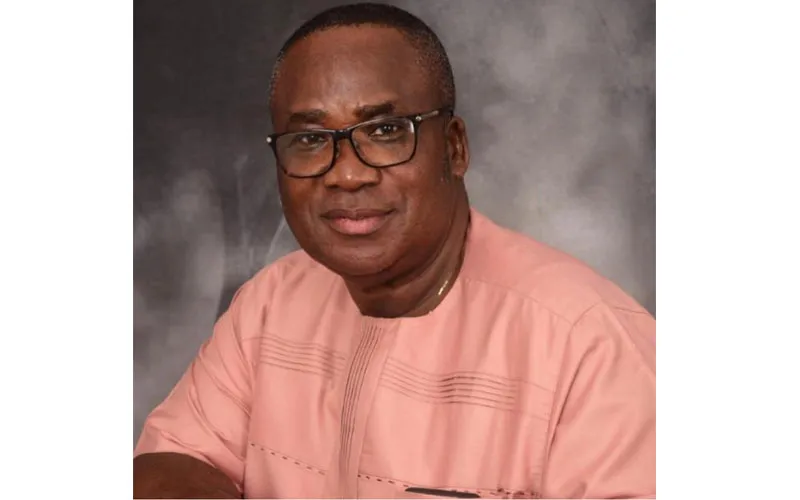 Adams Malik, alumnus of the School of Faith and Leadership of Nigeria's Benin City Archdiocese. Credit: Fr. Dr. Andrew Ovienloba
Adams Malik, alumnus of the School of Faith and Leadership of Nigeria's Benin City Archdiocese. Credit: Fr. Dr. Andrew Ovienloba


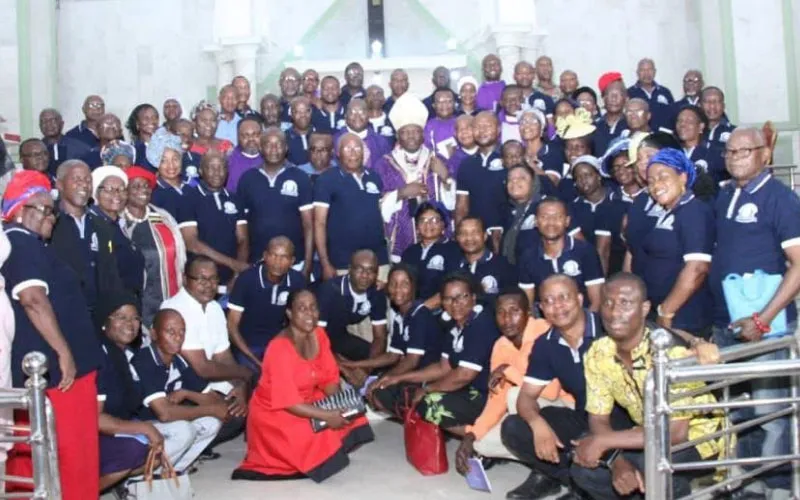
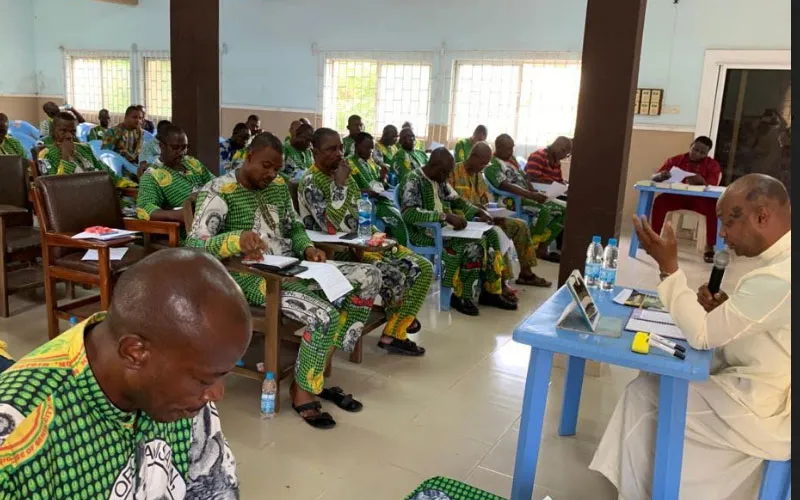 Credit:Fr. Dr. Andrew Ovienloba
Credit:Fr. Dr. Andrew Ovienloba
 Credit: Fr. Dr. Andrew Ovienloba
Credit: Fr. Dr. Andrew Ovienloba Credit: Fr. Dr. Andrew Ovienloba
Credit: Fr. Dr. Andrew Ovienloba Credit: Fr. Dr. Andrew Ovienloba
Credit: Fr. Dr. Andrew Ovienloba Credit: Fr. Dr. Andrew Ovienloba
Credit: Fr. Dr. Andrew Ovienloba Credit: Fr. Dr. Andrew Ovienloba
Credit: Fr. Dr. Andrew Ovienloba Credit: Fr. Dr. Andrew Ovienloba
Credit: Fr. Dr. Andrew Ovienloba Credit: Fr. Dr. Andrew Ovienloba
Credit: Fr. Dr. Andrew Ovienloba Credit: Fr. Dr. Andrew Ovienloba
Credit: Fr. Dr. Andrew Ovienloba


